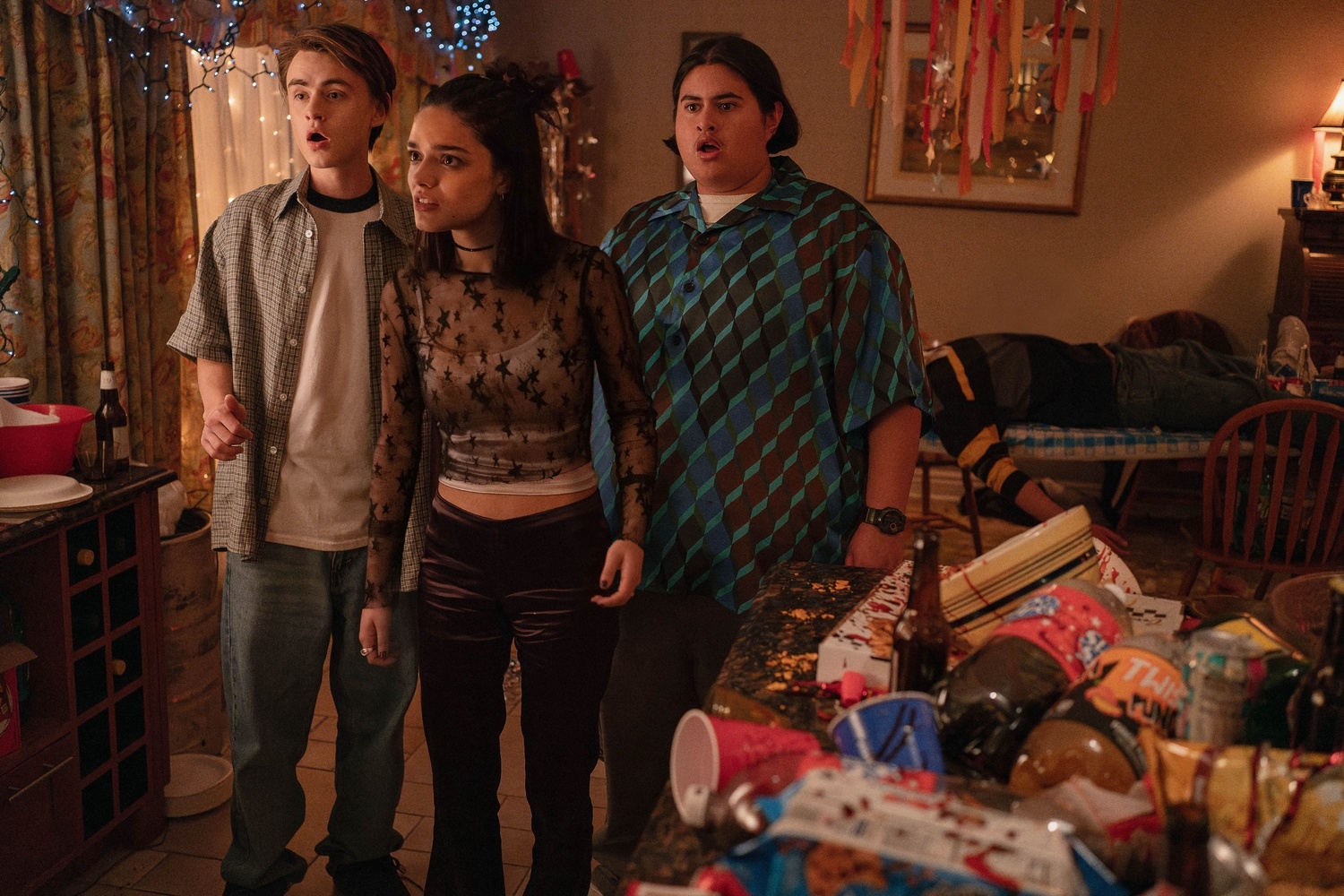
News
Summers Will Not Finish Semester of Teaching as Harvard Investigates Epstein Ties

News
Harvard College Students Report Favoring Divestment from Israel in HUA Survey

News
‘He Should Resign’: Harvard Undergrads Take Hard Line Against Summers Over Epstein Scandal

News
Harvard To Launch New Investigation Into Epstein’s Ties to Summers, Other University Affiliates

News
Harvard Students To Vote on Divestment From Israel in Inaugural HUA Election Survey
Kyle Mooney and Evan Winter Discuss ‘Y2K’: A ‘Nostalgic’ Albeit Stilted Comedic Gore-Fest
Dir. Kyle Mooney — 3 Stars

Kyle Mooney has made a career of depicting awkward characters. Publishing low-res skits to YouTube and later starring on SNL, Mooney both rode and helped to facilitate the 2000s wave of cringe comedy that continues to crest into 2024.
With Arms Race Productions founder and close friend Evan Winter, Mooney co-wrote “Y2K.” The A24-backed, Jonah Hill-produced movie follows high school misfits as they confront the apocalypse, caused by a computer rounding error involving the digital calendar switch between 1999 and 2000.
“Something hit me in my hangover,” Mooney recalled in a round table interview with The Crimson.
Five years ago, Mooney woke up from a New Year’s bash with the seed for his latest movie.
“Y2K actually happens with some sort of machine monster or something to that effect, [I] texted Evan and then we started chatting about it, and started pitching on it, and I feel like within a week, we had most of the major ideas.”
In “Y2K,” Mooney applies his awkward character template to the story itself, and the result is — well, awkward.
While Mooney’s past work puts ungrounded characters in grounded situations, “Y2K” does the opposite. ’90s-coded archetypes — as if pulled from an episode of “Freaks and Geeks” — are shoved into a story that jarringly flip-flops between horror, comedy, romance, period piece, and coming-of-age tropes.
“You want [the show] to hit broadly, but you also want to have that level of subversion that feels real to you,” said Mooney. “That’s something I think I learned over the course of SNL.”
“Y2K,” in essence, is a feature-length SNL sketch, and many of its subversions are comically top-notch. One such subversion comes moments after the main cast of characters band together and narrowly avoid absolute catastrophe. Having just battled and escaped a robot monster, one character — sporting a pair of roller blades — trips, falls, and dies. Like that, he joins the crowded ranks of “no longer living” in a hilarious, surprising, blink-and-you’ll-miss-it moment.
“Y2K” excels when it pushes sentimentality aside and embraces the dark humor of its premise. Unsurprisingly, the movie’s best scene comes during the promised Y2K collapse. The spectacle of this drawn-out, nostalgia-driven, cleverly-executed splatter-fest is almost worth the price of admission alone. Limbs are lost, heads are electrocuted, and precious bodily regions are totally eviscerated. Machines come to life — out for complete, violent revenge against their human creators.
Mooney commented that “the scale is bigger” in “Y2K” versus his and Winter’s past work.
“We have some ideas that we want to throw in the ring, but they’re just very artistic and intuitive to our voice and to what I think works for the culture at large,” said Mooney.
But if “Y2K” is any indication of the direction A24 is headed, there may be cause for concern.
“Y2K” works better as a series of marketable moments than a feature-length horror-comedy movie. After Y2K actually happens, the movie becomes overly complacent with itself, relentlessly dishing out the same robot-inflicted deaths and ‘90s-inspired references. “Y2K” is less “Evil Dead” and more “Maximum Overdrive” — tonally confused and lacking in continual invention that otherwise keeps butts in seats. Death by giant robots is cool at first, but the schtick gets old pretty quickly.
The movie’s only forward movement comes in the form of shoehorned character development — like the predictable love story between Eli (Jaeden Martell) the dweeb and Laura (Rachel Zegler) the attractive-yet-genius popular girl. Believe it or not, Laura’s computer-savviness comes in handy during the movie’s climactic hacker montage.
Eli and Laura’s romance is at its most resonant as they slide down a steep hill in a porta-potty. Face-to-face, they clutch each other tightly, brown sludge streaming down and across their bodies. Brian McKnight soulfully belts out “Back at One” in the background. Mooney and Winter justifiably cite this song, as well as Fatboy Slim’s “Praise You,” as their personal favorite tracks in “Y2K.” However, after McKnight sings his final note and the porta-potty comes to a halt, the romantic spark randomly fizzles, and Eli decides to brood — all for what seems like the sake of extending the movie’s runtime.
“Hopefully the characters themselves — the way they were written — are timeless enough that [the actors] were able to approach them whether they had the context or not,” remarked Mooney of the movie’s young cast, many of whom were born after Y2K.
While Martell and Zegler’s cardboard characters leave much to be desired, their partners in crime — CJ (Daniel Zolghadri) and Ash (Lachlan Watson) — are indeed “timeless,” interesting, and emotionally compelling. Through heartfelt exchanges of dialogue intermixed with freestyle rap, CJ and Ash break their respective know-it-all and punk archetypes wide open to reveal relatable vulnerable interiorities.
“I think I’ve always had a minor obsession with Y2K because it was just such a letdown,” said Mooney. “It was this thing that was promised to be a massive event, and then nothing happened.” “Y2K” is neither a “letdown” nor a “massive event.” Rather, it is a fine movie that mostly hits its mark, but lacks in the imagination and tonal coherence that make similar indie darlings truly great.
—Staff writer Joseph A. Johnson can be reached at joseph.johnson@thecrimson.com. Follow him on X @onlyjoejohnson or on Threads @officialjoeyj.
Want to keep up with breaking news? Subscribe to our email newsletter.
